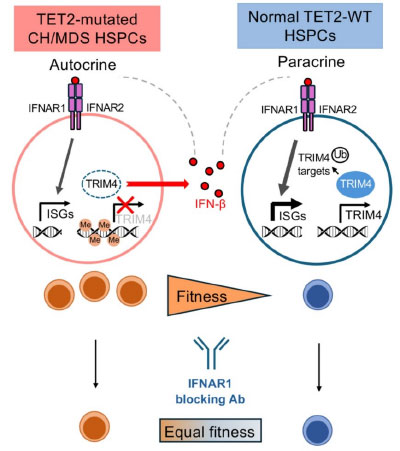
Researcher Profiles

Eirini Papapetrou, M.D., Ph.D.
Icahn School of Medicine at Mount Sinai
2025 Funding Recipient
Role of the type I interferon pathway in the clonal fitness of TET2-mutant cells
Discovery Research Grant 2025
PROJECT SUMMARY
 The cells that give rise to myelodysplastic syndrome (MDS) often pre-exist in the bone marrow and blood and expand for many years before the onset of the disease. This condition, called clonal hematopoiesis, is caused by mutations acquired by blood stem cells that give them the ability to overgrow normal stem cells. Studying these mutant cells before MDS develops is challenging. They are rare cells coexisting with normal cells and do not have distinctive features that allow us to isolate them and study them. To overcome this limitation, my laboratory created cellular models of mutant blood stem cells using induced pluripotent stem cell (iPSC) technology. With these models we discovered a new mechanism that promotes the clonal fitness of mutant cells. We found that these stem cells secrete a cytokine, interferon beta. Interferons cause inflammation and suppress the growth of normal blood stem cells. We found that the mutant cells, unlike normal cells, are resistant to the effects of interferon, and thus gain a growth advantage. Importantly if we block interferon with an antibody, we can reverse the advantage of the mutant cells. In the proposed work, we will test the effects of this antibody in cellular and mouse models in which we can transplant human cells. An antibody that blocks interferon has already been developed as a drug and is in clinical trials for autoimmune diseases. We will also identify other potential therapeutic targets in the inflammation pathway.
The cells that give rise to myelodysplastic syndrome (MDS) often pre-exist in the bone marrow and blood and expand for many years before the onset of the disease. This condition, called clonal hematopoiesis, is caused by mutations acquired by blood stem cells that give them the ability to overgrow normal stem cells. Studying these mutant cells before MDS develops is challenging. They are rare cells coexisting with normal cells and do not have distinctive features that allow us to isolate them and study them. To overcome this limitation, my laboratory created cellular models of mutant blood stem cells using induced pluripotent stem cell (iPSC) technology. With these models we discovered a new mechanism that promotes the clonal fitness of mutant cells. We found that these stem cells secrete a cytokine, interferon beta. Interferons cause inflammation and suppress the growth of normal blood stem cells. We found that the mutant cells, unlike normal cells, are resistant to the effects of interferon, and thus gain a growth advantage. Importantly if we block interferon with an antibody, we can reverse the advantage of the mutant cells. In the proposed work, we will test the effects of this antibody in cellular and mouse models in which we can transplant human cells. An antibody that blocks interferon has already been developed as a drug and is in clinical trials for autoimmune diseases. We will also identify other potential therapeutic targets in the inflammation pathway.
